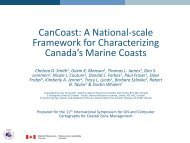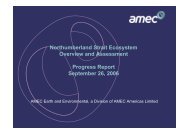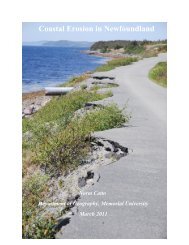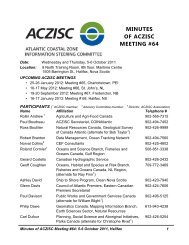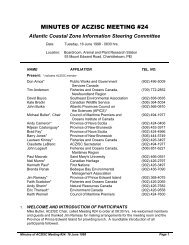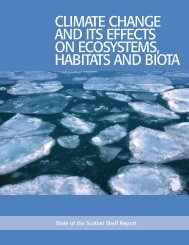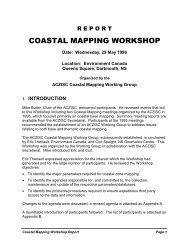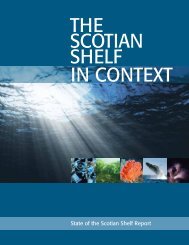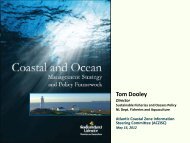Download PDF - COINAtlantic
Download PDF - COINAtlantic
Download PDF - COINAtlantic
- No tags were found...
You also want an ePaper? Increase the reach of your titles
YUMPU automatically turns print PDFs into web optimized ePapers that Google loves.
Global ocean observing system for western Caribbean: implementation andprogress of a tool to support climate change adaptation in ColombiaCarolina García-Valencia, Donaldo Juvinao & Paula Sierra-CorreaInstituto de Investigaciones Marinas y Costeras INVEMAR, Santa Marta. Colombiacarolina.garcia@invemar.org.co, donaldo.juvinao@invemar.org.co, paula.sierra@invemar.org.coAbstractWe describe the implementation process of a global observing system for the western Caribbean Sea for monitoringof meteorological and oceanographic variables as part of contributions to support definition and implementationof adaptation measures in Caribbean costal and insular areas in the climate change context in Colombia. The systemis conceived through the integration of information and software tools for the treatment of meteorological andoceanographic data from several sources including real-time information acquired from marine weather stations,historical data compendium from scientific research and permanent monitoring ecological stations. The informationis stored in a database and online newsletters and disclosures to decision makers are generated. Improved collectingand understanding of ecological and oceanographic data sets will help us formulate adaptation measures that moreeffectively will manage climate variability and changes.IntroductionThe Caribbean coast of Colombia is particularly vulnerable to the impacts of climate change. Given the naturalresources of the country, climate change impacts are anticipated to have significant and long-term effects in degradationof coastal ecosystems, coastal erosion, damage of infrastructure and unique and traditional sites and cities,contribute to the impoverishment of biodiversity of species of global importance and especially on fragile andunique marine ecosystems (such as unique corals in the western Caribbean). Climate change impacts in this regionhave been quantified in loss of 17% of terrestrial land, including coastal areas of San Andres Island due to erosionand sea level rise, impact on wetlands, coral reefs, and atolls, coral bleaching will become more widespread (Navaset al., 2010) and is anticipated to impact as much as 65% of regional fisheries (IDEAM et al., 2011). Thus the needarises to generate climate data that may explain changes in ocean dynamics and their influence on the dynamics ofmarine and coastal ecosystems (Buddemeier et al., 2004).Uncertain and insufficient information on global climate change prevents the adoption of cost-effective adaptationmeasures. Historical data and observations on climate trends are not available, for local and regional coastalareas of Colombia and Caribbean west and are insufficient to provide a basis to make decisions and projections. Inaddition, climate discontinuities and recent trends present anomalies that make correlation with the past difficult anduncertain. Also, information on climate trends is barely in the public domain and there is little awareness of localimplications.In 2006, Colombia identified actions to begin to address the imminent environmental changes (sea level rise andfloods) as a result of climate variability and change as a priority and developed the first study on Integrated NationalAdaptation Project INAP to climate change. The insular component of INAP was developed by Marine and CoastalResearch Institute INVEMAR and CORALINA (Sustainable Development Corporation for San Andres, Providenceand Santa Catalina archipelago). Colombian insular areas have been identified as highly vulnerable to sea level rise,however, limited data sets do not allow preparation for this phenomenon and, do not improve regional models in theCaribbean. The project involves the design and implementation of adaptation measures (program) in Caribbeaninsular areas to reduce the vulnerability of economic activities, infrastructure, population living close to the coast,and beaches in Colombia. One activity under this project was the implementation of Global Ocean Observing Systembased weather monitoring stations in the Western Caribbean. The activity included the installation of two meteoceanographicstations in marine protected areas, understanding that monitoring the state of coastal oceans can facilitatepredictions of how the environment will respond to changing global climate, are crucial for coping and adaptingto climate phenomena at local and regional levels. Later in 2011, INVEMAR carried out the project "Strengthen-23



